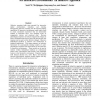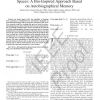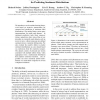2632 search results - page 98 / 527 » Predictive Representations of State |
AIIDE
2006
13 years 11 months ago
2006
Affective reasoning holds great potential for interactive digital entertainment, education, and training. Incorporating affective reasoning into the decision-making capabilities o...
ISMB
2000
13 years 11 months ago
2000
Knowing the number of residue contacts in a protein is crucial for deriving constraints useful in modeling protein folding, protein structure, and/or scoring remote homology searc...
TSMC
2010
13 years 4 months ago
2010
In Smart Spaces (SSs), the capability of learning from experience is fundamental for autonomous adaptation to environmental changes and for proactive interaction with users. New re...
EMNLP
2011
12 years 9 months ago
2011
We introduce a novel machine learning framework based on recursive autoencoders for sentence-level prediction of sentiment label distributions. Our method learns vector space repr...
SIAMJO
2010
13 years 8 months ago
2010
A linear matrix inequality (LMI) is a condition stating that a symmetric matrix whose entries are affine linear combinations of variables is positive semidefinite. Motivated by th...




